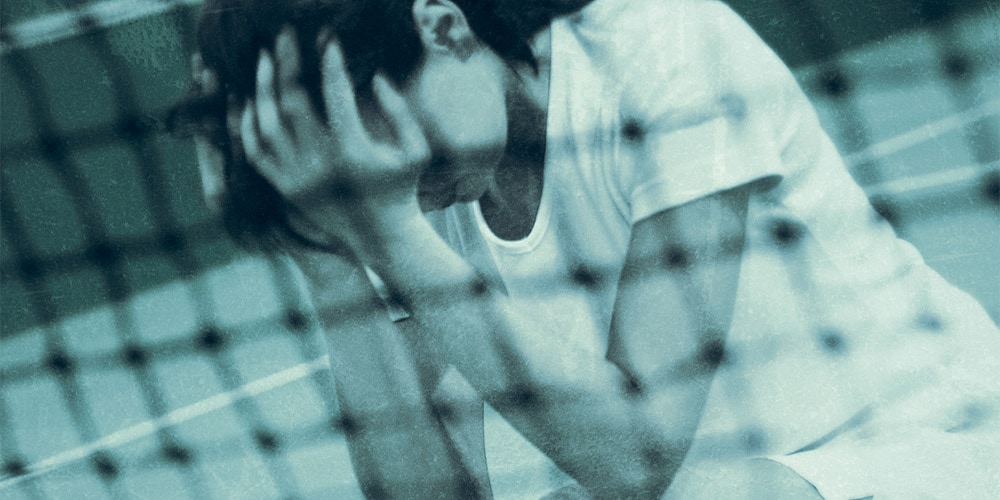
She has whipped up a storm on the court; played her heart out; but in life, as in tennis, somebody always wins and somebody always loses. This time she is the loser—wronged, injured, harmed, hurt, unfairly treated. Yes, there were set points and break points, advantages and even “love” a time or two. But the game is over now, and she is the loser, a big loser.
She wants to drag herself to the net, but her soul screams, He wronged me! Her head burns. She feels the taunt of his burning eyes: I did, and there is nothing you can ever do about it. They think I won fair and square. Wisps of the aroma of reconciliation, distant strains from songs about forgiveness jeer and mock at the parody of her life. Why would she go to that net, anyway? Shestruggles to recall all that she had learned about this crucial life lesson.
There are many half-truths, whole lies, and plain myths about forgiveness. Knowing what it is not is a first step to avoiding otherwise-inevitable pitfalls that can accompany the pain of being wronged.
That is impossible. As human beings we are hard- and soft-wired to remember wrongs done to us; to remember the negative; to readily recall the adverse situations of our lives.
Forgiveness does not mean that our memory traces are wiped clean and we go on living as if nothing ever happened. To admonish someone to forget the wrong that was perpetrated against them often adds insult to injury, revictimizing the injured and reinforcing the wrong.
The beauty and power of forgiveness is its consciousness of trauma. True forgiveness does notneedto forget the injury or eliminate the perpetrator.Empowering forgiveness teaches us to choose to take back the power from the villain, to decide howthe incident will be remembered, and give back control to the wronged. Not forgive and forget, but forgive while remembering—effectively, efficiently, and well.
Forgiveness is no happy excursion into the gray twilight of denial, a Pollyanna that both dismisses and disrespects the enormity of the wrong or the impact to the wronged. Forgiveness is not agreeing with miserable comforters that it really wasn’t that bad; that bad things happen to good people all the time; that you just need to suck it up, turn the other cheek, count to 100 and see the pain vanish because, after all, time heals all wounds.No, forgiveness allows the victim to see injustice for the evil that it is; and still chooseto forgive.
Forgiveness is the quintessential sign or evidence of strength. The weak cannot forgive; the naive cannot grasp the enormity of the experience; the powerless lack the strength that forgiveness requires. Forgiveness is both explicit and implicit goal-directed behavior. Embracing the decision to forgive takes courage, grit, and gumption that go against every natural, healthy emotion that screams for justice, decries injustice, and sues for vengeance. Forgivers draw on sources of strength beyond themselves (Phil. 4:13); of strength that is perfected by our weakness as victims (2 Cor. 12:9).1
It is a dangerous myth that true forgiveness changes the person who did the wrong; that a sign of forgiveness is the fact that the perpetrator will recognize and admit their wrong, and properly appreciate the pain they caused. The focus of true forgiveness is the change that it engenders in the victim.It is the stewardship of my personal healing, not the stewardship of another’s perverse cruelty. That other may never know they were forgiven. They may be long dead, far distant, or invested in stubbornness. Offenders may choose to reject proffered pardon. Forgiveness is independent of their response. Forgiveness still prevails, because it is primarily for the forgiver, not necessarily for the forgiven.

Forgiveness has been too easily equated with reconciliation. The myth is that if I forgive someone for a wrong, we automatically become friends. In the myth the handshake at the net repairs breaches; reestablishes broken relationships. This has been known to occur. But it is no given. Forgiveness is about recognizing and accepting that injury was done, and choosing to breakthe toxic, negative bond that ties up victim and offender in a self-defeating choke hold.
Reconciliation, on the other hand, works to builda new bond. The term comes from two words meaning “again” and “bringing together.” Those reconciled with one another dobecome friends again, build something together again, and restore something once lost between them. Yet in some instances victim-perpetrator friendship is impossible, even undesirable. But there is nevera case in which forgiveness is not critical to the victim’s own well-being.
Thus forgiveness is both its own necessity and a condition for possible reconciliation. It may be a major first step to reconciliation, but sometimes can be the only step that a victim takes.
Our player still lingers on the court,now reviewing her new question: What is forgiveness, anyway?
Psychologists have defined forgiveness as a conscious, deliberate decision to release feelings of resentment or vengeance toward a person or group who has harmed you, regardless of whether they actually deserve your forgiveness.
Within the past two decades, the scientific literature has reported results from a plethora of studies that confirm that anger is toxic to health and that forgiveness, by removing the power of that anger, improves cardiovascular health, mental health, and unhealthy stress levels. It is now well documented that forgiveness is essential for healthy marriages, parent-child relationships, and all other human relationships. Forgiveness increases kindness and happiness, and accounts for a grand portion of the variation in quality-of-life indicators.
As followers of the greatest Forgiver of all time and eternity (Luke 23:34), Christians have been commanded, admonished, and encouraged to forgive. Peter understood this from the Lord’s Prayer: “Forgive us our debts, as we also have forgiven our debtors” (Matt. 6:12).* He must have wondered how much time should be spent in this practice when he queried, “Lord, how often will my brother sin against me, and I forgive him? As many as seven times?” (Matt. 18:21). Jesus responded, “I do not say to you seven times, but seventy-seven times” (verse 22).
Other biblical passages caution that forgiving others is imperative if we desire God’s forgiveness for ourselves (Matt. 6:15). And again, “Be kind to one another, tenderhearted, forgiving one another, as God in Christ forgave you” (Eph. 4:32). In His own earthly life, one of Jesus’ last magnanimous acts was to forgive: “Father, forgive them, for they know not what they do” (Luke 23:34). If you are a true follower of Christ, you are a forgiver. The words “Christian” and “forgiver” are synonymous.
Forgiveness is no one-time, single event during which we get it over with, make the handshake, endure the hug, and shed copious tears at the nets of our lives. Static images from our childhood, of being ordered (“Go tell your brother you are sorry”), now frame our understandings.
Peter’s question may in fact have been: Can you really ever
completely forgive a person? What does Jesus think about it? We, and Peter, need to understand that forgiveness keeps forgiving for as long as life keeps living. We need the recognition that we may never get to the place where it is all done, complete, and finished. Every time we set eyes or mind on the one who has wronged us, we extend pardon to them again, and again, and again. The focus is not on Have I forgiven? but on How forgiving am I? Am I nurturing a forgiving personality? Do I have a forgiving heart?
She is still out there, all alone in her half of the court. She has reviewed what forgiveness is not and is. Now she wonders, What next, from now and forward?
There are core components that are critical to all forgiveness—whether on the individual, group, or global level. Empirical study of forgiveness shows that all varieties of forgiveness share three attributes in common:
Gaining a new perspective of the offender and of the event. My offender shares with me the brokenness of all fallen humanity, and has a heart “deceitful above all things, and desperately sick” (Jer. 17:9). This perspective is important in that forgivers accept what happened, acknowledge the hurt and betrayal, but see the offender as a fellow person like themselves, broken, bruised, flawed, even evil, and still say, I choose to forgive you.
The process of letting go: related to this process of releasing anger and reducing negative feelings toward the offender is finding that as the anger and negative emotions subside, we discover an increased possibility for compassion toward the offender.
The power and control contained in forgiveness: these reside, in part, with the decision to give up the deserved right of the victim for punishment, vengeance, and appropriate restitution. The power of forgiveness resides in the notion that even if the offender appears to get away with the crimes or wrongs done, the forgiver still forgives.
All true forgiveness seems to have this core goal: to break the negative bond (fueled and fed by anger, bitterness, and resentment) between victim and offender, and chooseto replace the negative with the positive. True forgiveness results in victims gaining insight and perspective on their own lives and experiences that benefit their whole being.
As she reflects on all that she has heard about it, she sees that meeting at the net can be the most beautiful thing, if only she could traverse the long walk there . . . I am she, and she is I. And you. And like all of us who travel this vale of tears, she must come to grips with the enormity of the challenge to which forgivers have been called.

We must pardon, not because we are better, but because we have been given what we need: free pardon. Our God has forgiven and is constantly forgiving us. Our experience of His forgiveness makes us His agents in the extension of the miracle of forgiveness to others who have wronged us or been wronged themselves. Forgiveness, we learn, is more about us, about God’s gift to us, a boon to our being, a beginning point to our plumbing of His unfathomably amazing grace.
Before we forgave, we were unforgiving victims, losers. But now, as we receive and share forgiveness, we are losers no longer, but friends of the forgiver God who is also judge of all the earth, the one who will fix everything just right in the end (Gen. 18:25; Rom. 12:19). And she, like us, must know now who is waiting for her at the net of her life, waiting for her to show up, yes, drawing her forward to receive, not cruel taunts, but sweet pardon for her own faults, and the awesome power that transforms us all into winners, “more than conquerors through him who loved us” (Rom. 8:37).
The net is no longer too far away. She is there, for much more than a perfunctory handshake and fleeting hug. As they cling to each other and refuse to let go, His voice is in her ear: “When you meet at the net, forgive.”
* Scripture quotations are from The Holy Bible, English Standard Version, copyright © 2001 by Crossway Bibles, a division of Good News Publishers. Used by permission. All rights reserved.
Ruth S. Williams teaches at Southern Adventist University, in Collegedale, Tennessee.